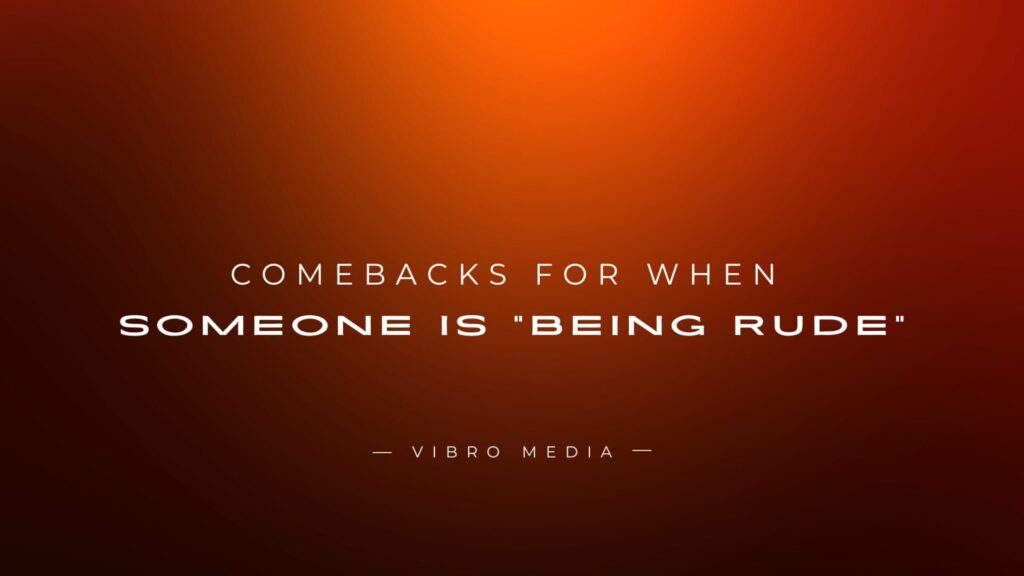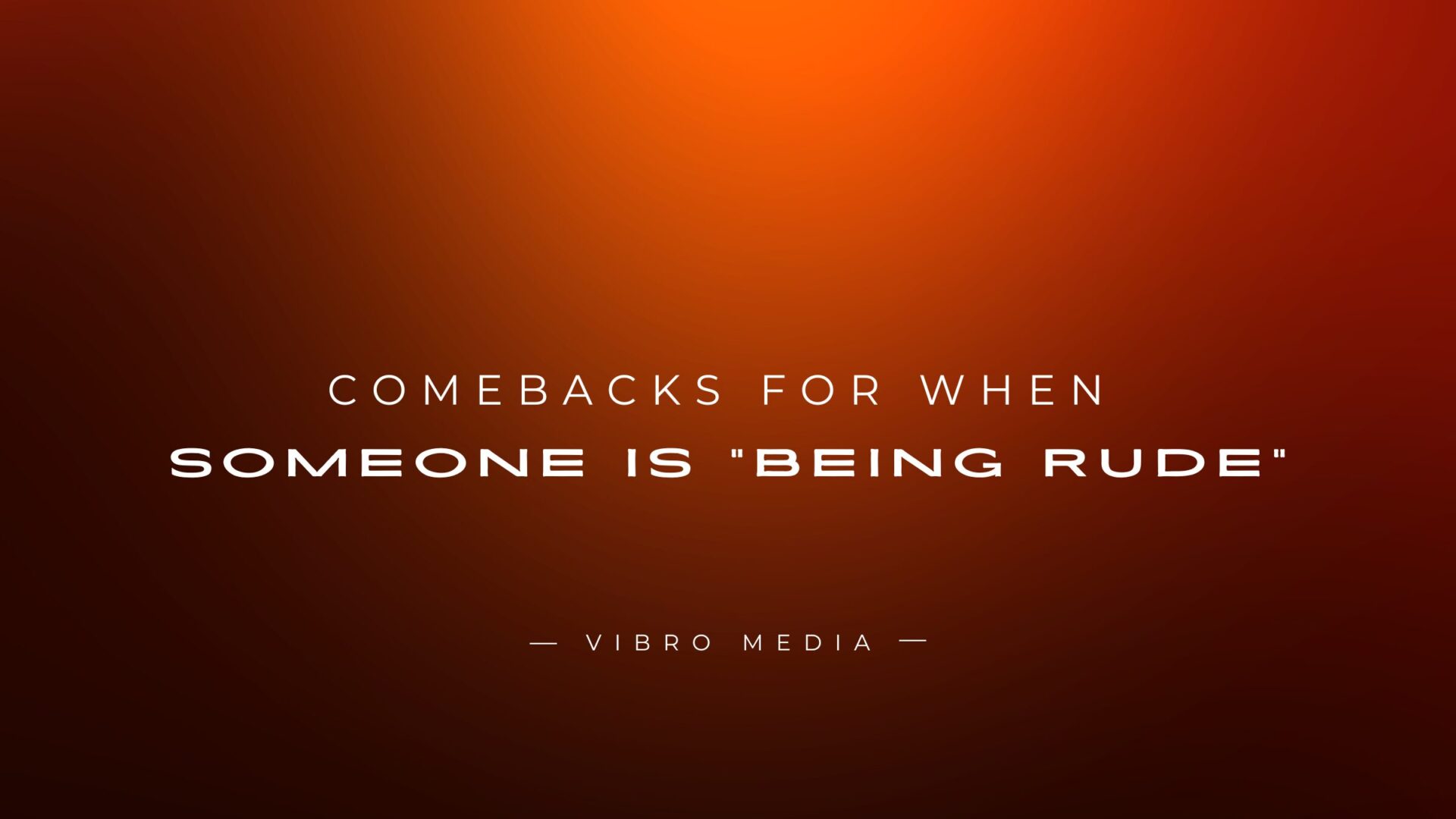We’ve all been there, right? You’re just going about your day, and then someone pops up with a comment that feels like a slap in the face. It can be frustrating and downright confusing when someone is “being rude.” So, how do you respond? Let’s dive into the world of rudeness, how it affects us, and the best ways to handle it.

200+ Comebacks for When Someone is “Being Rude”
Witty Comebacks
- I’m not arguing; I’m just explaining why I’m right.
- I’m on a seafood diet. I see food, and I eat it. I’ll stick to that.
- I’d call you a tool, but that implies you’re actually useful.
- I’m not saying you’re rude, but you’d make a great door-to-door salesman.
- I’m trying to see things from your perspective, but I can’t get my head that far up my butt.
- If ignorance is bliss, you must be the happiest person alive.
- I’d agree with you, but then we’d both be wrong.
- Thanks for sharing your opinion. I’ll add it to my list of things I don’t care about.
- I’m not a doctor, but I think you have a serious case of foot-in-mouth disease.
- Consider a career in stand-up comedy with material like that.
Sarcastic Remarks
- Oh, how original! I’ve never heard that one before.
- Thank you for your unsolicited advice; I’ll file it under ‘Things I Don’t Need.’
- Your insight is like a light switch—always off.
- Wow, you must be the expert on everyone else’s business.
- Thanks for the correction; I’ll be sure to tell the Nobel Committee.
- That’s an interesting perspective. Did you come up with that all by yourself?
- So, are you trying to be rude, or is it just a natural talent?
- I didn’t realize I was in the presence of such great wisdom.
- You must be fun at parties—do you always bring this much negativity?
- I’m glad you’re here to keep everyone grounded with your charm.
Polite Retorts
- I appreciate your perspective, but let’s keep the conversation respectful.
- Thank you for sharing, but I prefer to keep the tone positive.
- That’s an interesting point. Can we focus on solutions instead?
- I’d prefer if we didn’t resort to insults, we could do better.
- I hear you, but kindness goes a long way.
- While I see where you’re coming from, I’d rather not engage in negativity.
- Respectful dialogue is important to me; can we try that?
- I appreciate your opinion, but let’s approach this differently.
- I must keep this conversation constructive.
- I value your thoughts, but I think we can express them more adequately.
Direct Responses
- That was rude, and I don’t appreciate it.
- I’m not sure why you felt the need to say that.
- Can we keep the comments constructive instead of hurtful?
- That’s not a very nice thing to say; can we try again?
- I find that comment unnecessary and unkind.
- I think it’s best to avoid insults in our conversation.
- That comment was out of line; let’s focus on being respectful.
- I’d prefer it if you didn’t speak to me like that.
- Let’s not go down that road; it’s not helpful.
- I’d appreciate a more respectful tone when we talk.
Confident Comebacks
- Your opinion doesn’t define me.
- I know who I am, and your negativity won’t change that.
- I’m confident in my choices, regardless of what you think.
- Your rudeness says more about you than it does about me.
- I don’t need your approval to feel good about myself.
- Your comments are noted, but they don’t affect my self-esteem.
- I appreciate your feedback, but I’ll stick to my path.
- I’m proud of who I am, and I won’t let you take that away.
- You’re entitled to your opinion; just don’t expect me to care.
- I know my worth, and it’s higher than your comments suggest.
Humorous Comebacks
- I’m not sure what your problem is, but I’m pretty sure it’s hard to pronounce.
- I’d explain it to you, but I left my English-to-Dingbat dictionary at home.
- You’re like a cloud—when you disappear, it’s a beautiful day!
- I’d love to stay and chat, but I’m busy doing literally anything else.
- I don’t have time for your negativity; I’m too busy being awesome.
- You know, if you were any more full of yourself, you’d float away.
- I’d respond, but I’m allergic to stupidity.
- Did you hear that? It’s the sound of me not caring.
- I’m not saying you’re a problem; I’m just saying you’re not a solution.
- I didn’t realize we were having a contest for the rudest comment.
Empathetic Responses
- I can see you’re upset; is there something bothering you?
- It sounds like you might be having a tough day. Want to talk about it?
- I understand we all have off days, but let’s keep it respectful.
- I get that you might be frustrated; let’s find a better way to express it.
- I can relate to feeling overwhelmed, but that doesn’t excuse rudeness.
- We all have our moments; let’s aim for kindness.
- I appreciate your honesty, but let’s work on our tone together.
- I’m here if you need to vent, but let’s keep the conversation constructive.
- I get that emotions can run high; let’s find a better way to communicate.
- I can see you’re passionate about this, but let’s keep it civil.
Backhanded Compliments
- You’re really good at being rude; it’s a unique talent.
- Wow, you really have a way with words—just not the nice ones.
- You’re so bold with your opinions; it must take a lot of guts.
- I admire your confidence in sharing such unpopular views.
- It’s impressive how you can turn a simple conversation into a confrontation.
- I didn’t know you were such a connoisseur of bad manners.
- Your ability to speak without thinking is truly remarkable.
- You’ve mastered the art of negativity; well done!
- It’s great to see someone who knows how to make an impression—just not a good one.
- You always keep things interesting with your sharp tongue!
Questioning Responses
- What makes you think that’s an appropriate thing to say?
- Is that kind of comment helpful?
- What’s your goal in saying something like that?
- Have you considered how that might affect others?
- Is there a reason you feel the need to be rude?
- What led you to make such a negative remark?
- Are you aware that what you just said was offensive?
- Why do you think that’s a suitable way to communicate?
- How would you feel if someone said that to you?
- Is there a better way to express your feelings?
Deflecting Remarks
- That’s an interesting take! Let’s talk about something else.
- I appreciate your input, but let’s focus on the task at hand.
- That’s one way to look at it. How about we explore other perspectives?
- Thanks for your thoughts! Speaking of which, have you seen the latest news?
- I see your point, but I’m more interested in finding a solution.
- That’s certainly a viewpoint! How about we consider alternatives?
- Interesting opinion! Now, back to what we were discussing…
- You make a valid point. Let’s pivot and discuss something constructive.
- That’s a unique perspective! Now, what about the project deadline?
- Thanks for sharing! Now, how can we improve this situation?
Clever Insults
- I’d explain it to you, but I left my English-to-Dingbat dictionary at home.
- You’re proof that even evolution makes mistakes.
- I’d call you a tool, but that implies you’re actually useful.
- You bring so much joy when you leave the room.
- I’d agree with you, but then we’d both be wrong.
- You have the right to remain silent because whatever you say will be stupid.
- I’m not saying you’re rude; I’m just saying you’ve got a talent for it.
- Your face makes me want to see other people.
- You’re like a software update. Whenever I see you, I think, ‘Not now.’
- Somewhere, a village is missing its idiot.
Silence
- (Maintain eye contact and say nothing.)
- (Raise an eyebrow and stay silent, conveying disbelief.)
- (Pause for a moment, then change the subject without saying anything.)
- (Smile politely and remain quiet.)
- (Let out a small sigh and say nothing.)
- (Shake your head slightly and look away.)
- (Give a slight nod, then turn away without responding.)
- (Take a deep breath and remain silent.)
- (Hold a finger up as if to say one moment, and then stay quiet.)
- (Silently look at them, allowing the silence to speak volumes.)
Logical Retorts
- That’s an illogical statement; let’s discuss the facts instead.
- If you think about it, that argument doesn’t hold up.
- Your reasoning is flawed; let’s examine the issue more closely.
- Rudeness doesn’t contribute to constructive conversation.
- That perspective lacks evidence; let’s find a more logical approach.
- If we follow that line of thinking, it leads to a dead end.
- Your comment overlooks the bigger picture we’re discussing.
- It’s essential to approach this with rational thought, not insults.
- Let’s analyze the situation logically instead of resorting to rudeness.
- That’s not a reasonable assertion; let’s clarify the facts.
Positive Affirmations
- I appreciate your honesty, even if I don’t agree with your delivery.
- Thank you for sharing; it’s great to have open discussions.
- We can agree to disagree and still move forward.
- Your feedback is valuable, even when it’s hard to hear.
- I’m grateful for differing opinions; they can help us grow.
- We can find common ground despite our differences.
- It’s okay to express frustration; I’m here to listen.
- I admire your passion, but let’s channel it positively.
- I appreciate you voicing your thoughts; let’s keep the dialogue respectful.
- Your perspective adds value, and I’d love to hear it without the rudeness.
Subtle Threats
- Keep it up, and I might start ignoring you completely.
- Consider considering your tone before this conversation takes a turn.
- If rudeness were a sport, you’d definitely be a champion.
- I’d think twice about what you say next; I have a low tolerance for negativity.
- You may want to be careful; your words could come back to haunt you.
- I’m all for honesty, but there’s a fine line between honesty and rudeness.
- Continue down that path, and I might have to reevaluate our relationship.
- Remember, words can be powerful; they can either build bridges or burn them.
- If you keep talking like that, I might have to stop listening.
- It’s interesting how quickly a conversation can shift; I suggest we keep it respectful.
Humbling Remarks
- We all have our off days; take a moment to reflect.
- It’s okay to be wrong sometimes; we all are.
- You know, everyone has room for improvement, including you.
- Sometimes, it’s best to listen instead of speaking.
- You should reconsider your approach; kindness goes a long way.
- It’s important to remember that we all have our struggles.
- Rudeness doesn’t really elevate your status; it just shows your insecurities.
- You’re entitled to your opinion, but it might be wise to keep it to yourself.
- Your comment says more about you than it does about me.
- We all have the potential to uplift others instead of tearing them down.
Cultural References
- As Shakespeare said, ‘The better part of Valour, is Discretion.’
- In the wise words of Maya Angelou, ‘People will forget what you said; people will forget what you did, but people will never forget how you made them feel.’
- Like they say in The Godfather, ‘It’s not personal, it’s business.’ But this feels a bit personal.
- As Dumbledore would remind us, ‘It is our choices that show what we truly are, far more than our abilities.’
- In the spirit of ‘Friends,’ ‘We were on a break!’ but that doesn’t excuse rudeness.
- As the saying goes, ‘You catch more flies with honey than with vinegar.’
- In the immortal words of Frozen, ‘Let it go!’ Let’s not dwell on rudeness.
- Like Ferris Bueller said, ‘Life moves pretty fast. If you don’t stop and look around once in a while, you could miss it.’
- As Yoda wisely noted, ‘Do or do not; there is no try.’ Maybe try kindness?
- Remember what Captain America taught us: ‘I can do this all day.’ But can you keep it civil?
Reflective Comebacks
- Is that really how you want to represent yourself?
- What impact does that comment have on our conversation?
- How do you think that makes others feel when you say things like that?
- Have you thought about what you really want to achieve with those words?
- Is this the impression you want to leave with people?
- Let’s take a moment to think about how we’re communicating.
- What would you think if someone said that to you?
- Are you sure that’s the message you want to convey?
- What’s more important: being right or being respectful?
- Would you say that in front of others? It might be worth considering.
Brevity is Key
- Not cool.
- Let’s keep it respectful.
- That’s uncalled for.
- Really?
- Wow, okay.
- That’s enough.
- Point taken, but let’s be nicer.
- I’d prefer not to engage in rudeness.
- Let’s move on.
- That’s quite rude.
Challenging Assumptions
- What makes you think that’s a valid point?
- Have you considered that only some people share your view?
- Is it fair to generalize like that?
- What evidence do you have to support that statement?
- Are you sure you’re seeing the full picture?
- Is there another perspective you might be overlooking?
- Why do you assume everyone feels the same way?
- Have you thought about how that might not be true?
- What if the opposite were true?
- Could it be that your experiences don’t reflect everyone’s?
Understanding Rudeness
- What Does it Mean When Someone is “Being Rude”?
Rudeness can take many forms, from a dismissive tone to outright insults. When someone is “being rude,” they’re often disregarding social norms and showing a lack of respect. This behavior can stem from various factors, including stress, frustration, or simply a bad day.
Types of Rudeness
Rudeness isn’t a one-size-fits-all phenomenon. Understanding the different types can help us navigate our responses better.
- Passive-Aggressive Behavior
You know the type. Someone might smile while saying something hurtful. It’s like they’re throwing shade while pretending to be sunny.
- Direct Insults
These are straightforward and can hit hard. Direct insults leave no room for misinterpretation—someone is being rude, and it’s right in your face.
- Disrespectful Comments
Sometimes, rudeness hides behind seemingly innocent comments. These can be backhanded compliments or snarky remarks that leave you questioning the intent.
The Impact of Rudeness
- Emotional Consequences
Encountering rudeness can shake you up emotionally. You might feel angry, hurt, or even anxious. It’s natural to dwell on these feelings, but it’s essential to find a way to manage them.
- Social Dynamics
Rudeness doesn’t just affect the person on the receiving end; it can alter group dynamics, too. If someone is “being rude” in a social setting, others may feel uncomfortable, leading to a tense atmosphere.
- Workplace Implications
Rudeness in the workplace can be particularly damaging. It can disrupt team cohesion, lower morale, and even impact productivity. After all, who wants to work in a hostile environment?
Assessing the Situation
- Is It Really Rudeness?
Before jumping to conclusions, take a moment to assess the situation. Sometimes, what seems rude might stem from a misunderstanding.
- Consider the Context
Context is crucial. Was the person just informed of bad news? Are they under stress? Understanding the context can give you a different perspective on their behavior.
- Emotional State of the Rude Person
Ever notice that some people are rude when they’re upset? If someone is “being rude,” they might be struggling with their emotions. Recognizing this can help you respond with empathy rather than anger.
Strategies for Responding
Stay Calm and Collected
It’s easy to react impulsively, but staying calm is key. Take a deep breath, think, and respond rather than react.
- Breathe and Think
When faced with rudeness, taking a moment to breathe can make a world of difference. It’s like hitting the pause button before a critical scene in a movie.
Use Humor to Diffuse Tension
Sometimes, a little humor can lighten the mood. If appropriate, a witty comeback might just turn the situation around. Just be careful not to escalate the rudeness with your own!
Address the Behavior, Not the Person
Instead of attacking the individual, focus on their behavior. Saying something like, “I felt uncomfortable when you said that,” can help you express your feelings without escalating the conflict.
- Set Boundaries
If someone’s rudeness becomes a pattern, it’s crucial to set boundaries. Let them know what behavior is unacceptable.
- Know When to Walk Away
Sometimes, the best response is no response. If the situation feels volatile, don’t hesitate to remove yourself from the equation. It’s not worth the stress.
Verbal Responses to Rudeness
- Acknowledging the Comment
Acknowledgment can be powerful. You might say, “I heard what you said, and it felt rude.” This makes it clear that their behavior isn’t going unnoticed.
- Using “I” Statements
“I” statements help communicate your feelings without sounding accusatory. For instance, “I felt hurt when you said that” keeps the focus on your feelings rather than pointing fingers.
- Asking Clarifying Questions
Sometimes, asking for clarification can help diffuse a situation. Posing a simple question like, “What did you mean by that?” can prompt the other person to rethink their words.
Non-Verbal Responses
- Body Language Matters
Your body language speaks volumes. Maintain an open posture and eye contact, which can convey confidence and assertiveness.
- The Power of Silence
Sometimes, silence is golden. A pause can speak louder than words, giving the rude person a moment to reflect on their behavior.
Seeking Support
- Talking to Friends or Colleagues
If you’re feeling shaken by someone’s rudeness, talking it out with a friend or colleague can be therapeutic. They might offer insights or strategies you hadn’t considered.
- Professional Help if Needed
If rudeness becomes a frequent issue—especially in the workplace—consider seeking professional help. Sometimes, an external perspective can provide clarity and solutions.
Conclusion
In conclusion, navigating rudeness can be challenging, but with the right comebacks in your arsenal, you can handle any situation with confidence and wit. Whether you choose a light-hearted response to diffuse tension or a sharp retort to assert your boundaries, the key is to stay true to yourself and maintain your composure. Remember, it’s not just about responding; it’s about how you choose to express yourself in the face of negativity. For more ways to tackle confrontational moments,
Check out our:
200+ Best Comebacks for “How Dare You” Quick Guide
FAQs
Q. What should I do if rudeness continues?
If someone continues to be rude, address the behavior directly or limit your interactions with them.
Q. Is it okay to confront someone being rude?
Yes, confronting rudeness can be appropriate, especially if done respectfully. Use “I” statements to express how their behavior affects you.
Q. How do I deal with rude comments online?
For online rudeness, consider ignoring the comment, responding calmly, or reporting it, depending on the context.
Q. Can I ignore rude behavior?
Ignoring rudeness can be a valid strategy, particularly if it’s a one-time occurrence. However, repeated rudeness may need addressing.
Q. When should I report rudeness in the workplace?
Report workplace rudeness if it becomes a pattern, affects your work environment, or escalates to harassment.










